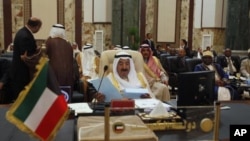Violence across Syria has killed at least 15 people -- most of them civilians -- as Arab leaders met in Baghdad for a landmark summit focused on trying to resolve the year-long Syrian crisis.
Syrian rights activists say forces loyal to President Bashar al-Assad launched assaults on opposition hubs in central Syria and the northern province of Idlib on Thursday.
Arab leaders were discussing a response to the Syrian crisis at a Baghdad summit, the first to be held by the Arab League in the Iraqi capital since Iraq's 1990 invasion of Kuwait. A loud explosion near the heavily fortified Green Zone disrupted the opening of the summit. Authorities said a rocket landed near the Iranian embassy, but caused no casualties.
Kofi Annan's Six-Point Peace Plan
- A Syrian-led political process to address the aspirations and concerns of the Syrian people.
- A U.N. supervised end to armed violence by all parties in Syria.
- Timely humanitarian assistance in all areas affected by fighting.
- Increasing the pace and scale of release of arbitrarily detained people.
- Ensuring freedom of movement for journalists.
- Respecting freedom of association and the right to demonstrate peacefully.
The leaders are expected to adopt a resolution calling on the Syrian government and opposition to implement the terms of a peace plan drafted by U.N.-Arab League envoy Kofi Annan. The plan urges both sides to start a cease-fire and a dialogue but does not call for Mr. Assad to step down as part of a political transition.
Arab leaders previously had urged the Syrian president to hand power to a deputy to manage the transition, but now they appear to have backed away from that demand.
Mr. Assad's government formally accepted the Annan initiative earlier this week. U.N. Secretary-General Ban Ki-moon said it is "essential" for the Syrian president to put those commitments into immediate effect.
Mr. Ban made the comment in a speech to Arab leaders at the Baghdad summit. He also accused the Syrian government of failing to fulfill its responsibility to protect its own people.
Nine Arab leaders traveled to Iraq for the summit, among them Kuwait's emir. It is the first time a Kuwaiti head of state has visited Iraq since the 1990 invasion by the forces of former Iraqi leader Saddam Hussein.
Iraqi authorities sharply increased security, hoping to show neighboring states that Iraq can maintain stability following the withdrawal of U.S. forces last December.
The United Nations says violence linked to Syria's crackdown on the revolt has killed more than 9,000 people.
Some information for this report was provided by AP, AFP and Reuters.
| Join the conversation on our social journalism site - Middle East Voices. Follow our Middle East reports on Twitter and discuss them on our Facebook page. |




